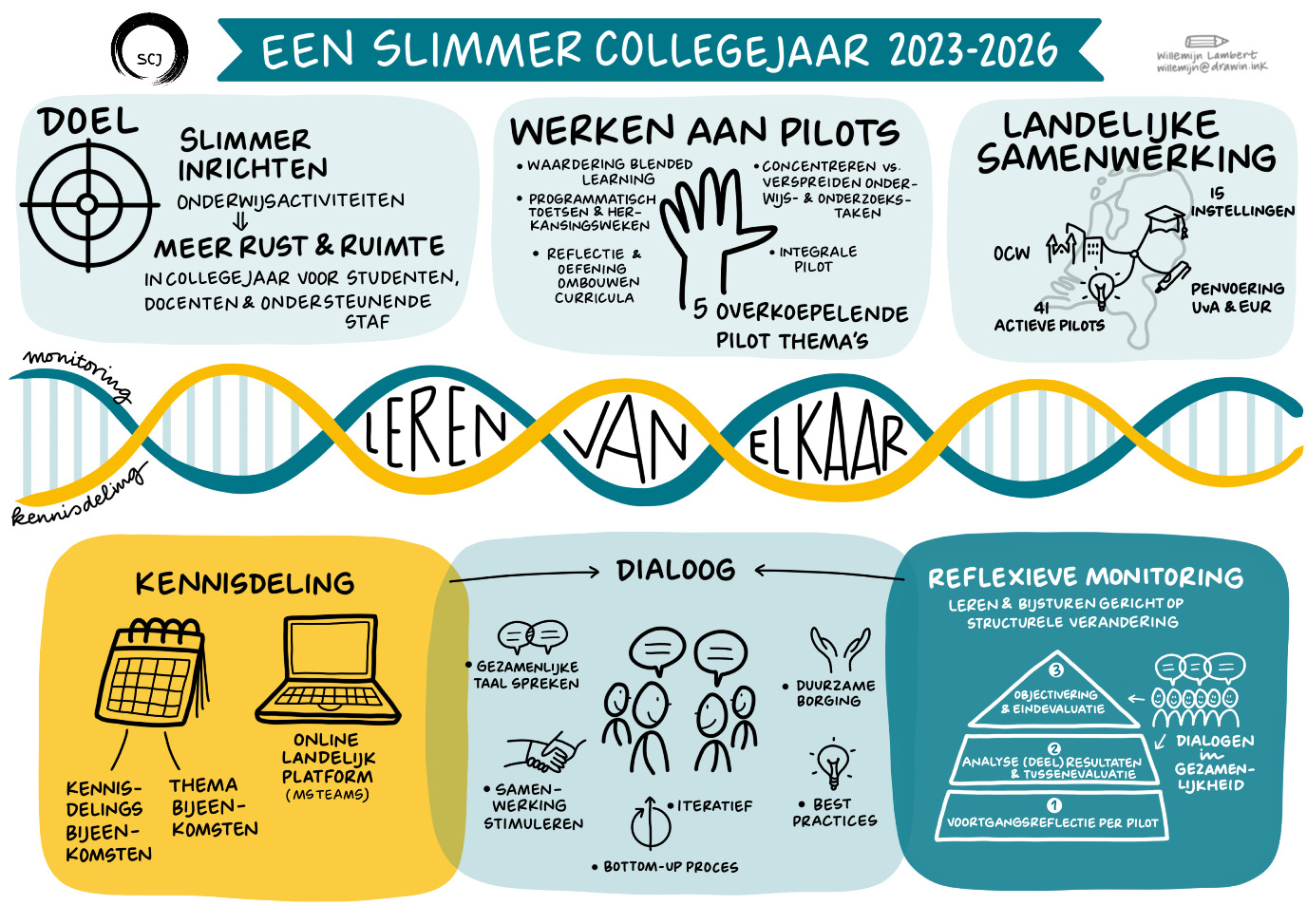University of Groningen participates in national pilot project ‘A smarter academic year’
The University of Groningen is participating in the national pilot project ‘A smarter academic year’, which aims to reduce the workload for lecturers and students and improve the studyability of programmes. The pilot project creates more space during the academic year, allowing time for other activities and more moments of rest. For lecturers, this means they can focus more on research, educational innovation and personal development, such as training and courses. Students will have more flexibility in their study planning, with room for their own pace, timing and assessment moments. In addition, the pilot programme offers extra space for internships, international experiences and a better balance between study, work and private life.
Pilot projects at the University of Groningen (2023-2026)
Between 2023 and 2026, the University of Groningen will carry out various pilot projects within its faculties, with each participating faculty giving its own interpretation to the pilot. Currently, the uniform academic year consists of four blocks of ten weeks each, eight weeks of teaching and two weeks of assessment. The pilots will experiment with various adjustments, such as:
-
Reducing the number of teaching and exam weeks
-
Clearly defining the Christmas break and teaching-free weeks between teaching periods
-
More formative assessment moments instead of summative ones
The content of the weeks that are freed up will vary per faculty and may include organised self-study periods, career days, time for research or conference visits. Two years after the start of the pilot, the results will be evaluated and the possibilities for scaling up will be examined.
Background and funding
This pilot was launched in response to a report by De Jonge Akademie, which concluded that the Dutch academic year is longer and more intensive than in other European countries. Dutch universities have an average of 5.5 extra teaching weeks and 3.8 extra exam weeks, which leads to a higher workload and study pressure and less room for innovation and research. The Ministry of Education, Culture and Science (OCW) is making a total of €10 million available for the national pilot projects, of which the University of Groningen will receive €225,000 annually.
Navigate directly to:

Success factors of the project within the University of Groningen
The project will be considered successful if the following criteria are met:
-
The results contribute to more peace and space for both students and staff.
-
The new structure of the academic year offers clear advantages in terms of reducing workload, which outweigh any disadvantages.
-
Best practices are identified for redesigning education, including improvements in assessment methods, planning, teaching methods and the structure of teaching periods.
-
Agreement is reached within the University of Groningen on a new, uniform structure for the academic year.
-
The studyability of programmes is guaranteed and not negatively affected.
Project implementation and support
The project will be implemented by faculty project leaders, supported by a steering team. This team consists of faculty education administrators, the student assessor of the Executive Board and representatives of the central staff for strategy and policy. In addition, the faculties will receive extra support in the areas of didactics, assessment, quality assurance, evaluation and legal matters from the university's central expertise.
Pilot projects at the University of Groningen
Philosophy
|
Contact | |
|
Section |
All undergraduate and graduate programs |
|
Description |
Intensify teaching to create rest weeks for students and faculty. |
|
Intervention |
Rest week for students at the end of each quarter. |
|
Result |
Students experience more rest; quieter quarter transitions for faculty. |
|
Website |
Read more about this pilot on MyUniversity of Philosophy |
Economics & Business
|
Contactpersoon
| |
|
Onderdeel
|
BSc Econometrics and Operations Research (jaar 1) |
|
Omschrijving
|
Herziening curriculum, betere spreiding toetsmomenten en toepassing blended learning om rust en ruimte voor studenten, docenten en ondersteuners te creëren. |
|
Interventie
|
7(6)+1 rooster, semester 1 incl. toetsing afgerond voor kerst, herkansingen per semester, studietijd tussen tentamen en herkansing. |
|
Resultaat
|
Meer rust door korter collegejaar, re-organisatie semester 1, minder herkansingsmomenten. |
Science & Engineering
|
Contact | |
|
Section
|
BSc Chemistry & Chemical Engineering BSc Physics & Astronomy & Mathematics |
|
Description |
Creating peace and space through breaks between blocks, fewer exam and lecture weeks. Attention to practicals and scalability across faculty. |
|
Intervention |
Integral approach with stakeholders, break between blocks, revise curriculum where necessary, and move resits. |
|
Result |
Reduce workload for students and (teaching) staff, reorganize teaching activities, responsibly reduce teaching and/or exam weeks. |
|
Website |
Read more about this pilot on MyUniversity van FSE |
Spatial Sciences
|
Contact | |
|
Section |
Alle undergraduate and graduate programs |
|
Description |
Shorten academic year, reduce test pressure, increase focus on professional development. |
|
Intervention |
7+2+1 timetable: import education-free weeks, remove subject overlap in learning objectives between subjects, move resits, free Christmas break, import extracurricular career week. |
|
Result |
Faculty-wide shortening of the academic year, more peace and less bureaucracy. |
Arts
|
Contact | |
|
Section
|
Bachelor's programs in American Studies, Greek & Latin and Art History. |
|
Description |
Create peace and space by shortening academic year, sharing best practices in doing so and making it scalable. |
|
Intervention |
Schedule revision: later start and earlier end. Less testing and therefore less resits.
|
|
Result |
More rest and more space for research and development. |
Contact
If you would like to know more about the Smarter Academic Year, please contact project leader Alexandra van den Doel or Hans Beldhuis (Strategy Department for Education and Students).
